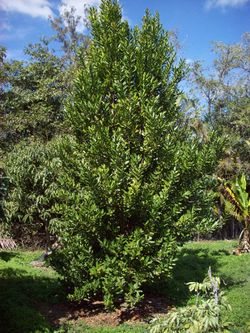Difference between revisions of "Bay leaf"
From Wikur Essential Oils and Fragrances
(→Chemical Constituents) |
|||
| Line 29: | Line 29: | ||
* [[beta-caryophyllene]] : 0,64 - 7,24 % | * [[beta-caryophyllene]] : 0,64 - 7,24 % | ||
* [[beta-chamigrene]] : 0 - 0,17 % | * [[beta-chamigrene]] : 0 - 0,17 % | ||
| − | * [[chavicol]] : <0,01 - | + | * [[chavicol]] : <0,01 - 21,6 % |
| − | * [[1,8-cineole]] : | + | * [[1,8-cineole]] : 0,2 - 1,39 % |
* [[cinnamaldehyde]] : 0 - 0,11 % | * [[cinnamaldehyde]] : 0 - 0,11 % | ||
| + | * [[methyl cinnamate]] : 1,1 % | ||
* [[alpha-copaene]] : 0,32 - 0,41 % | * [[alpha-copaene]] : 0,32 - 0,41 % | ||
* [[alpha-cubebene]] : 0 - <0,01 % | * [[alpha-cubebene]] : 0 - <0,01 % | ||
Revision as of 05:43, 19 March 2017
Don't confuse with Laurel leafContents
Classification
- Botanical Name : Pimenta racemosa
- Other Names : Bay St. Thomas, West Indian Bay
- CAS Number : 8006-78-8
- Origin :West Indies, Puerto Rico, Venezuela
Extraction Method
- Parts Used : Leaves
- Steam distillation
- Physical Description : yellow to amber brown clear oily liquid
Olfactory Description
- Family : Camphoraceous
- Perfumery Note: Top
- Medicinal fruity spicy herbaceous herbal fresh camphoraceous sweet warm balsamic
Chemical Constituents
- alpha-amorphene : 0 - 0,39 %
- aromadendrene : 0 - 0,09 %
- allo-aromadendrene : 0 - 0,28 %
- beta-cadinene : 0 - <0,01 %
- delta-cadinene : 0,28 - 1,03 %
- gamma-cadinene : 0,05 - 0,15 %
- alpha-cadinol : 0 - 0,30 %
- gamma-cadinol : 0 - <0,01 %
- calamenene : <0,01 - 0,07 %
- camphene : 0 - 0,14 %
- camphor : 0 - <0,01 %
- beta-caryophyllene : 0,64 - 7,24 %
- beta-chamigrene : 0 - 0,17 %
- chavicol : <0,01 - 21,6 %
- 1,8-cineole : 0,2 - 1,39 %
- cinnamaldehyde : 0 - 0,11 %
- methyl cinnamate : 1,1 %
- alpha-copaene : 0,32 - 0,41 %
- alpha-cubebene : 0 - <0,01 %
- para-cymen-8-ol : 0 - <0,01 %
- para-cymene : <0,01 - 0,97 %
- alpha-para-dimethyl styrene :0 - 0,30 %
- beta-elemene : 0 - 0,20 %
- eugenol : 44,41 - 68,93 %
- eugenyl acetate : 0 - 0,51 %
- alpha-farnesene : 0 - 0,59 %
- geranial : 0 - 0,22 %
- geraniol : 0 - 0,12 %
- globulol : 0 - 0,36 %
- alpha-gurjunene : 0 - 0,13 %
- alpha-humulene : 0,15 - 1,31 %
- limonene : 2,07 - 3,90 %
- linalool : 0,13 - 3,63 %
- methyl chavicol : 0,03 - 0,05 %
- methyl eugenol : 0 - 11,88 %
- alpha-muurolene : 0 - 0,05 %
- gamma-muurolol : 0 - <0,01 %
- myrcene : 0,10 - 16,17 %
- beta-ocimene : 0,08 - 1,52 %
- 3-octanol : 0 - 0,84 %
- 3-octanone : 0 - 1,10 %
- 1-octen-3-ol : 0 - 1,74 %
- alpha-phellandrene : 0,07 - 0,45 %
- alpha-pinene : 0,46 - 0,47%
- beta-pinene : 0 - 0,09 %
- sabinene : 0 - <0,1 %
- alpha-selinene : 0 - 0,63 %
- beta-selinene : 0 - 0,33 %
- spathulenol : 0 - 0,12 %
- terpinen-4-ol : 0,05 - 0,90 %
- alpha-terpinene : 0,02 - 0,19 %
- gamma-terpinene : <0,01 - 0,16 %
- alpha-terpineol : 0,14 - 0,52 %
- terpinolene : 0,09 - 0,24 %
- alpha-thujene : 0 - <0,1 %
